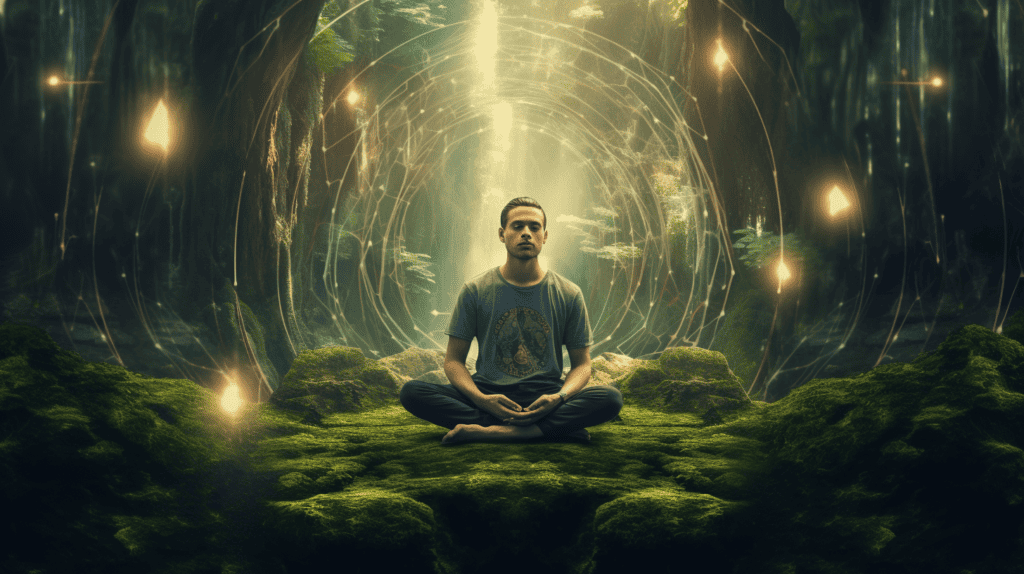Meditation is often touted as a powerful practice for reducing stress, increasing focus, and promoting mindfulness. However, while meditation certainly has many benefits, it is vital to be aware that meditation can also have harmful side effects. In some cases, when meditation goes wrong, we need tools to get back on track.
I took up meditation many years ago as a way to deal with some anxiety I was experiencing. At first, the practice seemed to help – I felt calmer and more focused. However, after several months of diligent meditation, I began experiencing some troubling symptoms. I had difficulty sleeping, felt hyper-sensitive to light and sound, and lost motivation and interest in most activities. At one point, I even began experiencing dissociative episodes.
Concerned, I started researching meditation side effects and discovered that I was not alone. While most people find meditation beneficial, there is a small subset of meditators who have adverse experiences.
Key Takeaways:
- While meditation has many benefits, it can also have adverse side effects for some people. These can range from anxiety to depression to dissociation.
- Adverse reactions are more likely with intensive retreats, underlying mental health conditions, forced practice, and lack of guidance.
- If you experience disturbing symptoms, seek support immediately from teachers, health professionals, support groups, or therapy.
- Go slowly, remain calm, focus on relaxation, listen to your body, and find an experienced teacher to minimize problems.
- More research is needed to identify at-risk individuals and develop prevention strategies. Meditation may not be suitable for everyone.
- With proper precautions, most people can safely harness the positive benefits of meditation.
Adverse Effects of Meditation
In recent years, the phenomenon of meditation going wrong has started gaining more attention. Willoughby Britton, a clinical psychologist and neuroscientist at Brown University, is one of the pioneers researching the dark side of meditation. She runs a clinic specifically for meditators experiencing distress.
Some of the adverse effects Britton and others have documented include:
- Anxiety or panic attacks
- Depression or emotional blunting
- Dissociation – feeling disconnected from oneself or reality
- Mania
- Psychosis
- Re-experiencing trauma
- Sensitivity to light and sound
These adverse reactions can occur during intensive meditation retreats or regular daily practice. Novices and experienced meditators alike can be affected.
“One of the teachers told me, ‘Meditation is like going to the gym. You have to keep practicing regularly to get the full benefits.’ But I wasn’t feeling any benefits—I felt like something was going terribly wrong.” – Sam D., had adverse effects from mindfulness meditation
Why Do Problems Arise?
Meditation is not inherently harmful – it is very safe for most people when practiced correctly. However, some factors can make adverse effects more likely:
- Incorrect practice – If meditation is practiced incorrectly, such as straining or forcing the mind, it can backfire. Many people think they’re meditating but do not understand the proper techniques.
- Overdoing practice – Meditating for extended periods, like on intensive retreats, can be problematic for some. Even short daily meditations may be too much for the sensitive.
- Underlying mental health issues – Those with a history of trauma or psychiatric disorders seem to be more vulnerable. Meditation may aggravate their conditions.
- Disruption of ego – Some traditional meditation techniques aim to dissolve the sense of self. For some people, this causes extreme disorientation rather than liberation.
- Lack of community – Meditators can feel isolated and scared without an experienced teacher or sangha (community) to provide guidance when difficulties arise.
While meditation has existed for centuries, the modern mindfulness movement popularized short daily meditation sessions for the masses. Ten minutes of mindfulness helps most people feel calmer, but it does not guarantee that meditation is suitable for everyone. It is something to approach carefully.
Dan Lawton – Examining the Dark Side of Buddhist Practice
In 2019, independent journalist Dan Lawton published an intriguing article titled “When Buddhism Goes Bad” in Tricycle Magazine.
Lawton profiles the work of teachers like Willoughby Britton, who shine a light on adverse experiences in Buddhist meditation. He explores how Western Buddhism might set practitioners up for difficulties.
“Western Buddhism…lacks the resources and community support systems needed to deal with mental health issues that intensive meditation can bring on.” – Dan Lawton
Some of the problematic dynamics Lawton identifies in Western Buddhism include:
- Lack of cultural context – Buddhist practices evolved in Asia over thousands of years but are now taught piecemeal in the West.
- Intensive retreats – Lengthy retreats with 8+ hours of meditation per day are far removed from the lifestyle of an ordinary Buddhist practitioner in Asia.
- Self-diagnosis – Practitioners often determine their own readiness for advanced techniques like retreats without enough guidance.
- Presentation of teachers – Buddhist teachers are sometimes unrealistically depicted as perfect enlightened beings, leading to disillusionment.
- Romanticization of suffering – Discomfort during meditation can be erroneously seen as a sign of progress.
- Consumerist approach – Meditation techniques are often commodified and sold as products detached from the broader religious/ethical foundations.
Lawton suggests potential solutions such as reforming retreat culture, transparent investigation of teacher misconduct, and modernizing Buddhist teachings for relevance to contemporary society.
Britton agrees that problems can arise when meditation is separated from its traditional religious milieu and teachers are not properly vetted. However, she believes adverse effects can happen even in religious contexts when meditation is undertaken without sensitivity to individual differences.
Thoughtfully examining the shadows cast by Buddhism’s encounter with Western culture allows us to integrate contemplative practices in a wiser, more sustainable way centered on compassion.
My Own Experience

Looking back, I made several mistakes in my meditation practice that contributed to the problems I experienced.
First, I thought meditation involved clearing the mind and feeling nothing. When I continued having thoughts and emotions arise during my practice, I judged myself harshly and tried forcefully to suppress them and focus on my breathe. This only increased my anxiety and made me feel inadequate.
Secondly, I adhered rigidly to a set meditation schedule. Even when I was very sleepy or starting to feel ill, I sat down to meditate for my allotted 20 minutes as I thought I should. Rather than listen to my body’s signals, I ignored them in deference to routine.
Finally, I did not have an experienced teacher I could consult when difficulties arose. I felt confused and alone in dealing with the dissociative episodes and other troubling effects (most of it from a lot of changes). I did not know how to address what was happening without proper guidance skillfully.
Tips to Avoid Problems with Meditation
Meditation mishaps can be minimized by following certain best practices:
Go slowly and steadily – Start with 5-10 minutes per day rather than plunging into hours-long retreats. Gradually increase from there.
Focus on relaxation – Meditation should feel calming. If agitation or tension arises, try a different technique.
Find an experienced teacher – Learning proper techniques from a qualified instructor dramatically reduces risk.
Stay connected – Maintain relationships and engage in other activities to balance your life.
Listen to your body – Discomfort signals when it’s time to dial back or take a break. Don’t meditate through pain.
Get support – If challenging symptoms occur, get help immediately rather than tough it out alone.
While most people benefit from meditation, it does not work for everyone. It is crucial to keep in mind that there can be adverse effects for some individuals. However, with proper precautions, you are much less likely to experience any significant problems with meditation.
Seeking Help for Adverse Effects
If you try meditation and end up experiencing disturbing symptoms, do not despair. There are many resources available to help:
- Talk to your meditation teacher – Explain what is happening and ask for guidance tailoring the practice.
- Consider medical causes – Consult with your physician and a mental health professional to rule out underlying conditions.
- Find a support group. – Connect with others who have experienced similar experiences. Feelings of isolation exacerbate distress.
- Look into trauma therapy – If meditation is bringing up traumatic memories, therapies like Somatic Experiencing can help stabilize the nervous system.
- Avoid intensive retreats – Limit or cease meditation until you are feeling better. Lengthy retreats can make adverse effects worse.
- Adjust your practice – You may need to shorten session length, change techniques, or take a break.
- Focus on self-care – Regular exercise, spending time outdoors, or engaging in hobbies can be grounding.
Many struggling meditators heal and resume their practice with time and care. Having gone through a difficult period with meditation, I am much wiser now about how to engage mindfully in a way that enhances my life rather than harms it. My troubles taught me to approach meditation with humility and caution. It is a powerful practice but one that must be undertaken carefully.
Research on Adverse Effects of Meditation

Willoughby Britton and other researchers at Brown University have been at the forefront of the clinical study of adverse meditation experiences. Britton directs the Brown Clinic for Meditation-Based Therapies.
Some key findings from studies on meditation side effects include:
- Over 60% of meditators on retreats report adverse effects ranging from anxiety to hallucinations. These occur both during practice and afterward in daily life.
- 25% of meditators report decreased motivation or impaired functioning.
- 65% of meditation-related incidents meet the criteria for impairment or distress.
- Meditators scoring high on scales for absorption and deregulated emotion are most likely to report adverse effects.
- Even in studies reporting mostly positive effects from meditation, up to 12% of participants drop out due to adverse reactions.
Britton emphasizes that more research is needed to identify at-risk individuals and develop prevention strategies for adverse responses. Just as there are contraindications with specific medical treatments, meditation may not be suitable for everyone.
The Future of Meditation Safety
The popularity of mindfulness-based interventions and meditation apps has far outpaced the science of their effects. With increased usage, we are becoming more aware of potential downsides.
Moving forward, Britton suggests a few areas for improvement:
- Better screening – Identify pre-existing conditions or trauma that increases the risk of adverse reactions.
- Graduated approach – Slowly building up from minimal doses of meditation instead of intensive practice.
- Education on adverse effects – Informing practitioners about possible negative experiences so they are prepared.
- Support systems – Having resources in place for those who encounter problems.
- Individualized approach – Tailoring meditation recommendations based on someone’s unique situation.
With vigilance, the benefits of meditation can be harnessed while avoiding adverse outcomes. Just as medicine has advanced to limit side effects of treatments, the field of contemplative science must continue progressing on meditation safety.
Britton’s research reminds us that a one-size-fits-all approach to meditation – like 10 minutes per day of mindfulness for everyone – is likely insufficient. Meditation must be applied judiciously based on the needs and predispositions of the individual.
Conclusion on Avoid Getting Stuck While We Meditate
Meditation is an invaluable practice for me that reduces stress, increases connection, and promotes insight. However, my own journey has taught me that we must approach meditation intelligently – with care, humility, and awareness of its risks.
While meditation certainly has the potential to go wrong in some instances, adverse experiences can be avoided or overcome with proper support and a graduated approach tuned to each person’s needs.
The phenomenon of negative meditation experiences invites us to look at contemplative practices through a more nuanced sociological lens. Meditation does not exist in a vacuum immune from more significant cultural dynamics around mental healthcare, trauma, technology, and consumerism. As meditation continues to gain popularity in the West, we must continue broadening the conversation to include diverse lived experiences – both positive and negative. These more inclusive narratives help move us toward wiser applications of what remains, fundamentally, a compelling practice for self-realization.
FAQ on When Meditation Goes Wrong
Q: What are some possible negative effects of meditation?
A: Despite the positive effects of meditation, it can also have negative side effects. Some may experience “meditation sickness,” which often involves a loss of motivation or capability to do normal activities, or sometimes even physical sensations, like chronic pain.
Q: Can meditation and mindfulness ever go wrong?
A: Yes, meditation and mindfulness can push past initial discomfort to reveal chronic issues such as emotional trauma, which many might describe as “the dark night.” When this happens, people will feel like they have a heightened sense of negative energy within them, and this is not uncommon. This is when meditation has a negative effect.
Q: How common are negative effects from practicing meditation?
A: There aren’t significant statistics available about the occurrence of negative effects from meditation as it’s often an overlooked aspect of the practice. It is also often assumed that meditation is a powerful tool for good only, but like any tool, its effects can depend on the method and person using it.
Q: Are meditation centers aware of these risks of meditation?
A: Some meditation centers are aware and cautious of these risks, employing mental health professionals to consult with when issues arise. However, others may not fully acknowledge or understand the negative effects. In such cases, it’s important for individuals practicing meditation to understand both the positive and negative aspects of the practice.
Q: What is the teachers’ role when problems with meditation occur?
A: “One of the teachers” should be adequately trained to handle occurrences of negative experiences during meditation. Being able to guide a student through “the dark night” of their practice is crucial, as it can be a challenging and troubling experience. Also, teachers should be equipped to refer their students for professional psychiatric help should it become needed.
Q: Why isn’t meditation being researched for its negative side effects?
A: There is ongoing research, however, the focus is typically more on the benefits rather than the risks. The negative side effects of meditation are also often less reported or acknowledged due to the widely held belief that meditation is one of the key actions leading to better mental health. However, these negative effects are an essential aspect of the conversation around meditation.
Q: Can these negative effects deter people from meditation?
A: It can, particularly if the initial phases of meditation bring up discomfort or recurring pain. If these negative effects are not handled properly, they may deter people, but if handled correctly, they can also lead to breakthroughs in self-awareness and mental health.
Q: Is meditation more likely to go wrong for certain types of people?
A: It’s not necessarily specific types of people, but more about the types of meditation people choose, the intention behind their practice, their mental state, and whether or not they are guided by a professional or experienced meditator.
Q: Could meditation potentially worsen chronic pain?
A: Some people report their chronic pain worsening after meditation, a sensation that seems counter-intuitive given the established benefits of meditation for chronic pain management. Such instances could be part of the so-called “dark night” phenomena where buried traumas resurface during meditation. It is thus important to approach meditation with care and preferably under professional guidance when dealing with chronic pain.
Q: Can beginners face similar problems in meditation?
A: While it’s common for beginners to face some difficulties when they start meditation, such as maintaining consistency, focusing, and handling a variety of sensations, facing the more serious negative effects such as a loss of motivation, chronic pain or “meditation sickness” is less common but not impossible. It is advisable for beginners to start their journey in a meditation center exercises or under the guidance of an experienced teacher.





Leave a Reply